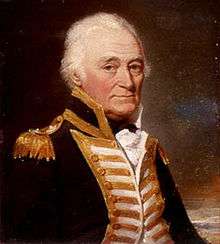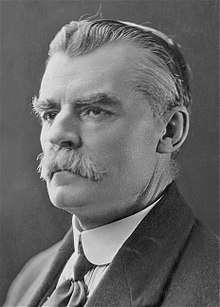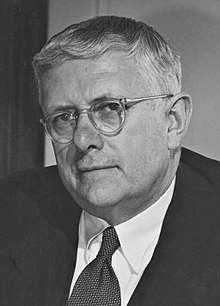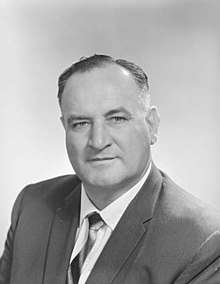Division of Hunter
The Division of Hunter is an Australian electoral division in the state of New South Wales. The division was proclaimed in 1900, and was one of the original 65 divisions to be contested at the first federal election. The division was named after Captain John Hunter, the second Governor of New South Wales. It covers rural, regional and suburban areas centred on the Hunter Region, including the towns of Singleton, Muswellbrook and Cessnock. It also extends into parts of Greater Newcastle, covering suburbs such as Cameron Park, Edgeworth, Toronto and Morisset.
| Hunter Australian House of Representatives Division | |
|---|---|
 Division of Hunter in New South Wales, as of the 2016 federal election. | |
| Created | 1901 |
| MP | Joel Fitzgibbon |
| Party | Labor |
| Namesake | John Hunter |
| Electors | 121,560 (2019) |
| Area | 10,640 km2 (4,108.1 sq mi) |
| Demographic | Rural |
The current member since the 1996 federal election, is Joel Fitzgibbon, a member of the Australian Labor Party.
History

The seat has been in Labor hands since 1910, and for most of that time has been reasonably safe for that party. The Hunter Region has been one of the few areas outside of capital cities where Labor has consistently done well. Among its notable members have been first Prime Minister, Sir Edmund Barton, former Labor Leaders Matthew Charlton and Dr H.V. Evatt, and Joel Fitzgibbon, who was a minister in the first and second Rudd governments.
The seat has been held by two father-son combinations. Rowley James held the seat from 1928 to 1958 before giving it up for Evatt, who was in danger of losing his Sydney-area seat of Barton and wanted a friendlier seat in which to run. Evatt was succeeded after one term by Rowley James' son, Bert, who held it until 1980. Eric Fitzgibbon won the seat in 1984, handing it to his son and current member, Joel, in 1996.
Two-party vote count
Hunter had become somewhat marginal in the 1980s when much of its territory was shifted to the newly created Charlton. Since 1990, Labor has never tallied less than 53 percent of the two-party-preferred vote. Labor's worst two-party-preferred vote was 2.4% in 1984 and best result when challenged by an opposing center-right candidate was 80.6% in 1961.
First-preference vote count
Labor's worst first-preference vote was in 2019, when the current member won only 37.5% of the primary vote; the previous 100-year worst being 44.5% in 2013, again by the incumbent member. Labor's best primary vote was a thumping 76.9% in 1946. As of 2019, the Division of Hunter is considered a marginal seat.
2015 proposed abolition
In 2015 the Australian Electoral Commission announced plans to abolish the federation seat of Hunter. Due to changing populations, overall, New South Wales was to lose a seat while Western Australia was to gain an extra seat. Electors in the north of Hunter were to join New England. The roughly 40 percent remainder were to become part of Paterson, with the Liberal margin calculated to be notionally reduced from 9.8 percent to just 0.5 percent as a result. Since the Commission's guidelines require it to preserve the names of original electorates where possible, the commission proposed renaming Charlton to Hunter.[1][2][3]
The final plan, however, saw Charlton abolished, with Hunter pushed slightly eastward to absorb much of Charlton's former territory.[4] While most of the new Hunter's voters come from the old Charlton, as previously mentioned, Commission guidelines required the name of Hunter to be retained.[5] The Labor incumbent for Charlton, Pat Conroy, brokered a factional deal to contest neighbouring Shortland in order to allow Fitzgibbon to continue to represent Hunter.
Members
Election results
| Party | Candidate | Votes | % | ± | |
|---|---|---|---|---|---|
| Labor | Joel Fitzgibbon | 38,331 | 37.57 | −14.22 | |
| National | Josh Angus | 23,942 | 23.47 | −2.87 | |
| One Nation | Stuart Bonds | 22,029 | 21.59 | +21.59 | |
| Greens | Janet Murray | 7,007 | 6.87 | −0.22 | |
| United Australia | Paul Davies | 4,407 | 4.32 | +4.32 | |
| Animal Justice | James Murphy | 3,267 | 3.20 | +3.20 | |
| Christian Democrats | Richard Stretton | 2,356 | 2.31 | −1.07 | |
| Socialist Equality | Max Boddy | 687 | 0.67 | +0.67 | |
| Total formal votes | 102,026 | 91.03 | −1.09 | ||
| Informal votes | 10,049 | 8.97 | +1.09 | ||
| Turnout | 112,075 | 92.29 | −0.04 | ||
| Two-party-preferred result | |||||
| Labor | Joel Fitzgibbon | 54,050 | 52.98 | −9.48 | |
| National | Josh Angus | 47,976 | 47.02 | +9.48 | |
| Labor hold | Swing | −9.48 | |||
References
- "Australian Electoral Commission to abolish Federal NSW seat of Hunter". ABC News. Australia. 16 October 2015.
- "Draft federal redistribution of New South Wales". Poll Bludger, Crikey. 16 October 2015.
- "Labor's Joel Fitzgibbon loses his seat in redistribution by Australian Electoral Commission". The Age. 16 October 2015.
- Green, Antony. "Hunter". ABC Election Guide 2016. Australian Broadcasting Corporation.
- "NSW federal redistribution 2015". ABC News. Australia.
- Hunter, NSW, Tally Room 2019, Australian Electoral Commission.
.jpg)
.jpg)

.jpg)


